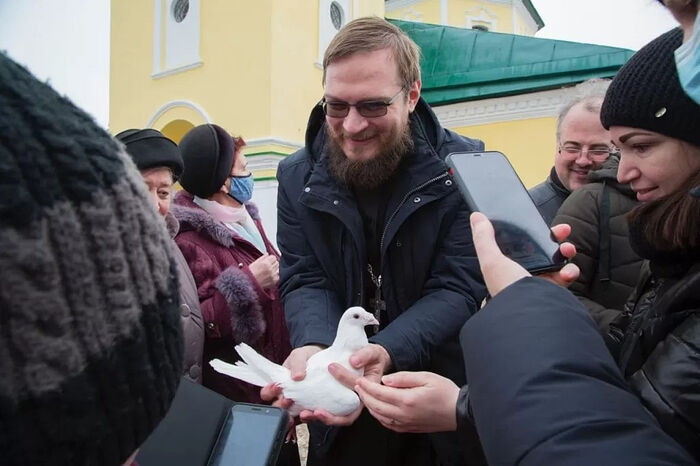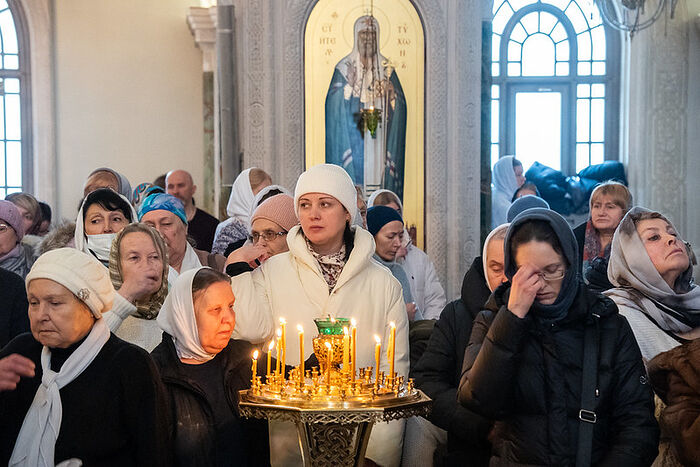The witness to our Lord Jesus Christ and His work of salvation through preaching both in word and deed, and through one’s entire Christian life, is the indisputable mission of every Orthodox Christian. Both preaching the Resurrection of Christ and any good deed performed by a Christian contribute to the revival of the fullness of Church life and prove the truth of our faith in the eyes of those who have not yet entered into the Church.
 Photo: E-format.livejournal.com
Photo: E-format.livejournal.com
In modern conditions, every Orthodox believer has a wide scope of activities in the field of preaching Christ. The service of spreading the Gospel is of great benefit not only to those at whom this preaching is aimed, but also to preachers themselves. According to St. John Chrysostom, “no one can succeed in the work of his own salvation without saving his neighbor.” Every Orthodox Christian, regardless of his social status, can become a “co-worker with God” in enlightening others by the Good Tidings of salvation. Complications and failures are possible in this difficult work in the name of Christ. But doesn’t a true Christian feel the desire of Christ Who lives in him to save his neighbor’s soul, irrespective of possible obstacles?
One of the obstacles to “churching” people around us is the extreme diversity of society, the level of awareness of one’s place in the Church, or the degree of understanding of the need for salvation. There are more or less several types of people interested in religion and spirituality, and our approach to them on matters of faith varies greatly.
The first type is believers who have recently come to the faith and have little knowledge of the basics of the Orthodox worldview. They are called “neophytes”, or converts. Emotionally categorical, with superficial knowledge and insufficient experience, they cannot assess Church life soberly and objectively or understand Church teaching correctly. Neophytes need a mission for their integration into Church life. It should be remembered that it is a long and thorny path. At the initial stage, neophytes are in a rosy state of acquiring faith rather than in the faith itself. Believers of this category need the strict spiritual guidance of an experienced father-confessor, as neophytes are often very aggressive and intolerant towards different ways of thinking and ways of life, which in the long run affects their personal spiritual state.
The second type are those who were baptized in Orthodoxy, but for some reason chose another Christian denomination (Catholicism, Protestantism), while retaining a respectful attitude towards their cradle faith. Being in fact heterodox, they have not developed a negative attitude towards the Orthodox Church, but they are ready for dialogue and do not deny their background. Contact with representatives of this category, and even more so the possibility of the return of these “prodigal sons and daughters”, depends only on a deep spiritual conversation. Besides, it is necessary to give them the opportunity to have their say. After all, the problem often hides deep inside a person and becomes even more hidden when you try to moralize. When someone speaks and analyzes themselves, including doubt over the correctness of choosing a new religion, the problem can become visible and undeniable. It requires the ability to listen to a person, give him the opportunity to look into the depths of his conscience, and refraining from any moralizing, wait for his questions and answer them wisely.
The third type, which is the most numerous, are people who were baptized at birth but are totally indifferent to Orthodoxy and spirituality and do not show any interest in them. It is not so productive, but perhaps an unseen service, according to the proverb, “perseverance wins”, is possible here. Any benevolent and positive approach will help here: a conversation or a talk that destroys negative stereotypes about the Church and coldness of the heart, moral advice, preferably over a cup of tea, a personal example of faith and daily (and joint) prayer for the lost sheep of the fold of Christ. Frankness and sincerity in communication, genuine concern for the salvation of souls, and the ability to dispel doubts and answer tricky questions will inspire nominal Christians to acquire faith.
 Priest Anthony Rusakevich. Vk.com
Priest Anthony Rusakevich. Vk.com
And finally, there is the fourth type, the most difficult for Christian mission—these are atheistically or anti-clerically minded people, for whom the Church and spiritual subjects cause only negative emotions. You should not enter into aggressive and emotional polemics with such people, but, on the contrary, you should show the utmost caution, tact, and a civil attitude. Rudeness and aggression on the part of a Christian, even in the name of a good purpose, can, to the contrary, completely convince atheists and secularists of their “rightness”. Most often, these are people who were baptized in infancy, but unfortunately, for a number of reasons (sometimes not even dependent on them) they are opposed to religion and spirituality. Sometimes not even a priest, but a competent layperson should talk to these people so as not to cause rejection and aversion in them, but on the contrary, dispose them to a conversation based on mutual trust. The possibility of converting such people is not associated with polemics or enlightening talks, but with a good personal example of a Christian himself, which is conducive to neutralizing an atheist’s hatred and destroying negative stereotypes about Orthodoxy.
It is only through good examples and a constant search for optimal solutions, through sincere love and real motivation that the Christian mission to enlighten “this world” is possible.





